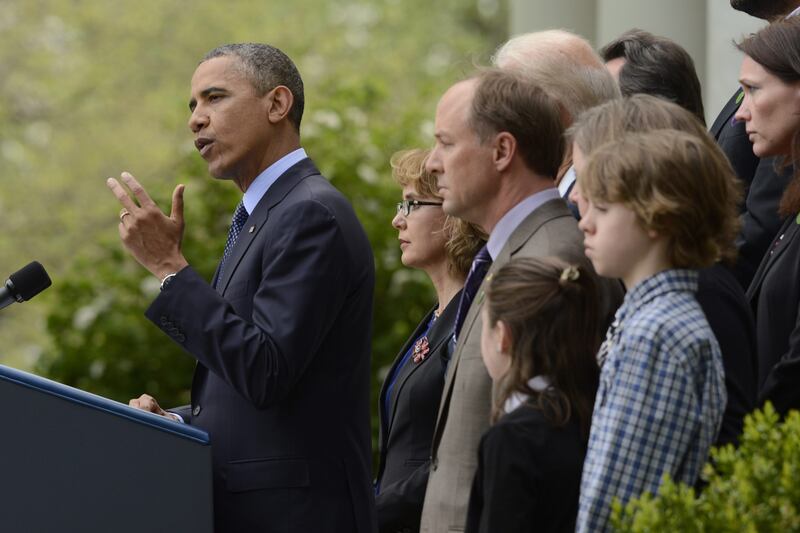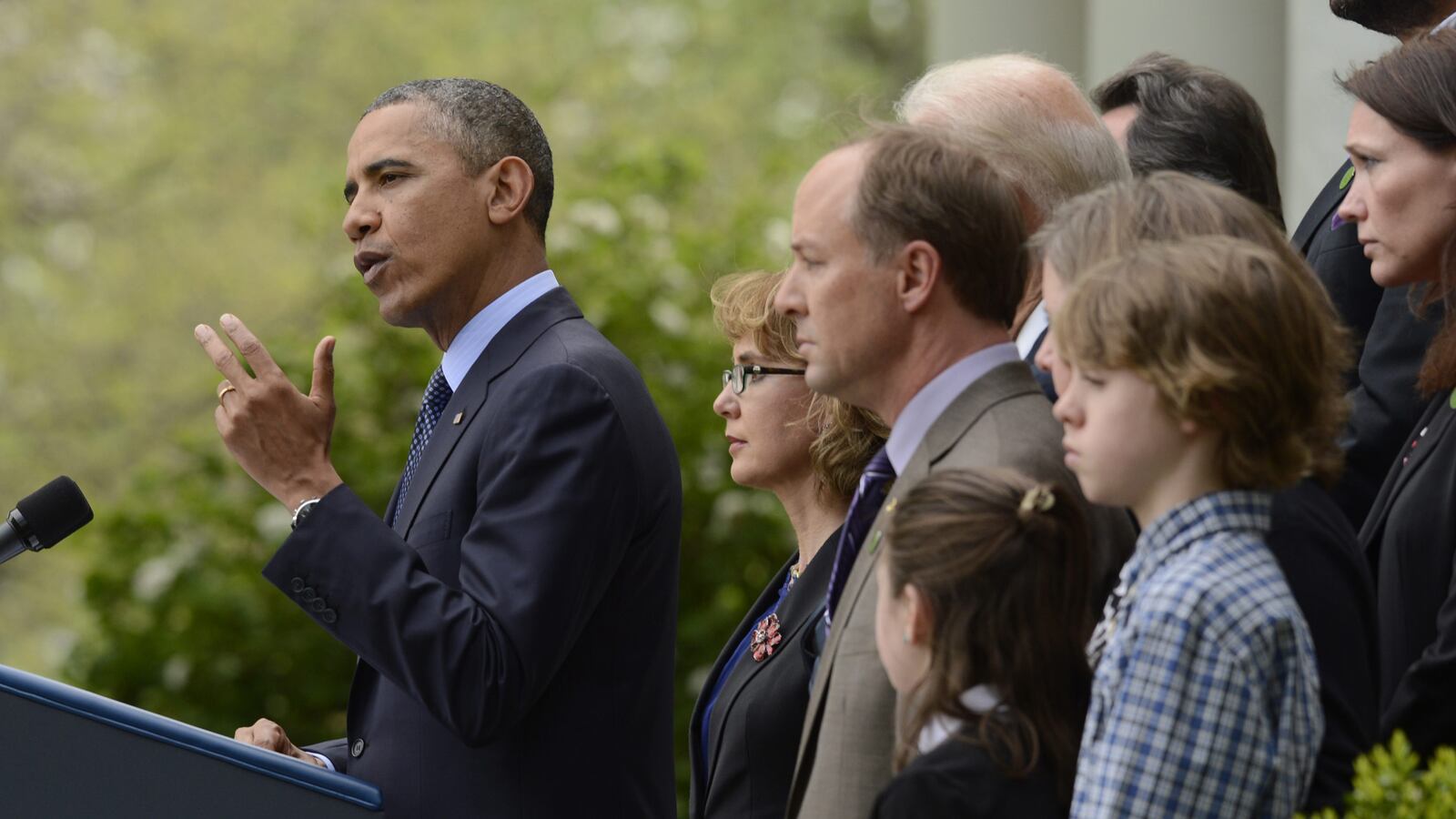The rap against Barack Obama, at least on the left, has long been that he’s too cautious, too calculating, too conciliatory. Not a guy willing to take risks.

We can apologize now.
What Obama did in the four months between December’s Newtown shooting and this Wednesday’s Senate capitulation was one of the great displays of presidential guts in American history. On gun control, the Democratic Party had been in the fetal position for years. By 2008, the party whose 1972 platform had proposed banning handguns was reduced to declaring: “We recognize that the right to bear arms is an important part of the American tradition, and we will preserve Americans’ Second Amendment right to own and use firearms. We believe that the right to own firearms is subject to reasonable regulation, but we know that what works in Chicago may not work in Cheyenne.” In 2009, when Illinois Rep. Mike Quigley tried to revive gun control legislation, House Democratic leaders refused even to hold a hearing. In 2010, Obama signed legislation lifting restrictions on carrying guns in federal parks. Last July, after a gunman killed 12 and injured 58 at an Aurora, Colorado, movie theater, White House Press Secretary Jay Carney told the press: “There are things that we can do, short of legislation and short of gun laws, as the president said, that can reduce violence in our society. We do need to take a broader look at what we can do to reduce violence in America. And that’s not just legislative, and it’s not just about gun laws.”
Even after Newtown, swarms of commentators warned that Obama would be a fool to take on such a quixotic cause. “There is absolutely no chance whatsoever of bipartisan gun control legislation,” University of Texas law professor Sandy Levinson told Bloomberg News the day after the massacre. “In the short term, we won’t see any new gun-control legislation,” added gun control expert Robert Spitzer. “Any hope that he [Obama] will lead an effort to enact substantive gun control is pure fantasy,” added an article in The Atlantic a few days later.
It would have been easy, maybe even defensible, for Obama to sign some innocuous executive orders and rationalize his caution by citing the importance of working with Republicans on immigration and the deficit. Instead, the White House worked desperately to keep public attention on gun violence and thus prevent the NRA from strangling legislation out of public view. In one of the most emotional scenes I’ve ever seen at a State of the Union address, Obama gestured to the parents of a slain Chicago girl named Hadiya Pendleton and then whipped the crowd into a frenzy by listing massacre after massacre and demanding “they deserve a vote.” He had a mother whose 6-year-old was murdered in Newtown deliver his weekly radio address. Michelle Obama, who has guarded her popularity by avoiding political controversy, almost broke into tears when she said, “Hadiya Pendleton was me” in a speech last week in Chicago.
Sure, Obama may have made tactical mistakes. Critics claim the White House waited too long before offering concrete proposals, and wasted time pushing an assault weapons ban that had no chance to pass. But this president, who is sometimes called reserved, aloof, and calculating, pursued gun control with a force of mind and soul that was astonishing to behold. “I never saw a president fight so hard,” remarked Sen. Barbara Boxer, “never on any issue.”
Why did he do it? In part because the Obama-as-timid meme was always a lie. Timid politicians don’t oppose the Iraq War when virtually every other nationally ambitious Democrat is supporting it. Timid politicians don’t challenge the Clintons in a Democratic primary. Timid politicians don’t overrule their chief of staff and push through health-care reform when the polls show Americans oppose it and their party has just suffered a devastating defeat at the polls.
But beyond that, I suspect that once Obama saw an opportunity, he pushed gun control so hard because he simply cares more. As a community organizer, he worked and lived in the kind of communities where Americans are most often shot. And even when he left, he remained a black man living in a city, and a country, where government often treats black life as cheap. Try imagining Ann Romney or Cindy McCain or even Hillary Clinton saying, as Michelle Obama did in 2008, that her husband “can be shot going to the gas station.” Try imagining them saying that “Hadiya Pendleton was me.”
And there’s one more reason. Republicans often describe America as a country that was once pure—at its founding, before the New Deal, or before the 1960s—was sullied and now must now be redeemed. Obama, by contrast, describes America as a protracted struggle to honor our best ideals by overcoming our evil past, a struggle in which heroes often die without ever seeing their labors bear fruit. It’s no coincidence that a month after Newtown, he swore his inaugural oath on the bibles of Abraham Lincoln and Martin Luther King, and spoke of “the star that guides us still; just as it guided our forebears through Seneca Falls and Selma and Stonewall.” It’s no coincidence that he so often quotes King (who was himself quoting the abolitionist Theodore Parker) as saying, “Even though the arc of the moral universe is long, it bends toward justice.”
Although Obama can’t say it, because he can never seem to focus on race, I’d bet my mortgage that he sees gun control as a continuation of the civil rights struggle. And although he’s described himself as part of the “Joshua Generation,” which enters the Promised Land, he knows that he too will fail to cross certain boundaries. The gun control struggle will likely continue for decades. And this week its arc feels particularly long. But one day, a future president will look back at the last four months as the moment when Barack Obama began to make it bend.






